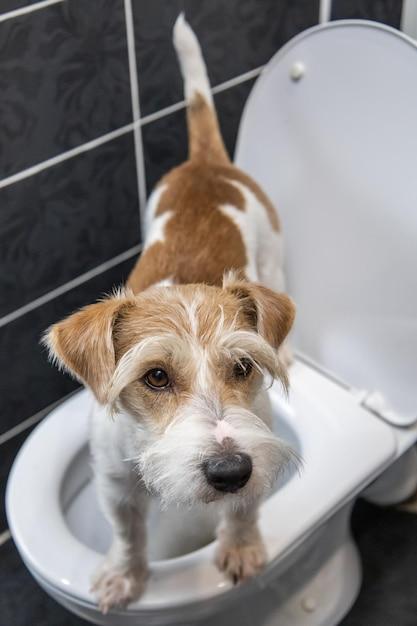As our beloved dogs enter their golden years, it’s essential to pay close attention to their health and well-being. One aspect that senior dog owners often have questions about is their furry friend’s urination habits. How often should senior dogs pee? Is it normal if they suddenly start peeing indoors? These are just a few of the questions we’ll address in this comprehensive guide.
In this blog post, we will delve into the factors that can affect a senior dog’s urination frequency. We’ll explore what is considered normal and when you should be concerned about your dog’s urinary habits. Additionally, we will touch upon conditions that may cause changes in urination patterns, such as doggie dementia and kidney failure. So, whether you’re wondering if your senior dog’s urination frequency is within the norm or if you suspect an underlying health issue, keep reading to find all the answers you need.
Let’s get started by understanding how often senior dogs should pee and what changes might warrant a closer examination of their health.
How Frequent Should Senior Dogs Take a Bathroom Break
As our furry friends enter their golden years, their bodily functions may undergo some changes, including how often they need to relieve themselves. Senior dogs often require more bathroom breaks than their younger counterparts. So, if you’ve been wondering, “How often should senior dogs pee?” – you’ve come to the right place!
Age and Bladder Control: The Inevitable Connection
Let’s face it – aging affects all living beings, and dogs are no exception. As our loyal companions get older, their body systems, including bladder control, may experience certain limitations. Just like us, they may not be able to “hold it” for as long as they used to in their bounding puppy days. Don’t fret, though – there are ways to manage this stage gracefully!
The Rule of Thumb: A General Guideline
While every senior dog is unique, there’s a general rule of thumb you can apply to gauge how frequently they might need bathroom breaks. Typically, seniors should have an opportunity to empty their bladders every four to six hours. Keep in mind that this is an approximate timeframe and may vary depending on various factors such as size, breed, health, and individual differences.
Age, Breed, and Size: The Triumvirate of Pee Frequency
As the saying goes, “Size matters.” And in the case of our senior dogs, age and breed matter too! Generally speaking, smaller dog breeds have smaller bladders, which means they may need to pee more frequently. On the other paw, larger breeds might have a bigger reservoir, allowing them to hold it longer. Furthermore, age plays a role – an older dog with bladder muscles that aren’t as strong as they once were might require more frequent potty breaks.
Signs to Look Out for: When Nature Calls
Sometimes, our senior furry friends may not be able to communicate their potty needs effectively. This means it’s our job as diligent pet parents to keep an eye out for certain signs that indicate they need to go. If you notice any of the following behaviors, it might be time to open that back door:
- Restlessness or pacing
- Frequent sniffing around the house
- Excessive whining or barking
- Sudden changes in posture (e.g., squatting or raised hind leg)
- Accidents in the house, even if they were previously house-trained
Adjusting Their Routine: Keep Them Comfortable
To ensure your senior dog is comfortable and happy, it might be necessary to make a few adjustments to their routine. Consider adding extra bathroom breaks throughout the day, especially after meals or drinking water. Keep in mind that older dogs may also require more frequent trips during the night, so be prepared for nighttime outings.
Consult Your Veterinarian: Age-Specific Advice
When it comes to the well-being of our senior canines, it’s always wise to consult with a veterinarian who can provide age-specific guidance. They can assess your dog’s overall health, any underlying conditions, and give personalized recommendations on how frequently your senior pup should take bathroom breaks.
Remember, our senior dogs have been there for us through thick and thin, so let’s be there for them in their golden years. By understanding their needs and making appropriate adjustments, we can ensure they enjoy a comfortable and dignified life!
FAQ: How Often Should Senior Dogs Pee
What do you do when your dog won’t pee
If your senior dog refuses to pee, don’t panic just yet! There could be a few reasons for this. One common issue is anxiety or stress, which can make your furry friend reluctant to relieve themselves. Try creating a calm and comfortable environment for your dog, and if the problem persists, consult with your veterinarian for further advice.
What if my dog hasn’t peed in 24 hours
If your senior dog hasn’t peed in 24 hours, it’s important to take action. This could be a sign of a urinary tract infection, kidney problems, or bladder issues. Make sure your dog has access to fresh water and encourage them to drink. If they still don’t pee, it’s time to seek professional help from your veterinarian.
Why is my senior dog peeing so much
If your senior dog is peeing more frequently, it could be due to a variety of reasons. One possibility is a condition called polyuria, which is often a sign of underlying health issues such as diabetes, kidney disease, or hormonal imbalances. Make sure to monitor your dog’s water intake and consult with your vet if the excessive peeing continues.
How long is too long for a dog to go without peeing
Typically, a dog should not go longer than 8 to 10 hours without peeing. However, this can vary depending on their age, health conditions, and bladder capacity. It’s important to establish a regular potty routine for your senior dog to avoid discomfort or potential health problems.
Do older dogs need to pee more often
Yes, older dogs tend to need more frequent bathroom breaks compared to their younger counterparts. As dogs age, their bladder muscles weaken, reducing their ability to hold urine for extended periods. Keep this in mind and provide your senior dog with ample opportunities to relieve themselves throughout the day.
What are signs of a dog dying of old age
Knowing when a dog is nearing the end of their life is undoubtedly difficult. However, some common signs include decreased appetite, lack of energy, difficulty breathing, and loss of bladder or bowel control. Monitor your senior dog closely, and if you notice concerning changes, consult with your veterinarian for guidance and support.
How do dogs act when they’re dying
When dogs are approaching the end of their life, they may exhibit various behaviors. They might become increasingly lethargic, show disinterest in food or water, withdraw from social interactions, and experience difficulty moving or standing. It’s important to provide comfort, love, and gentle care during this challenging time.
Why is my senior dog suddenly peeing in the house
If your senior dog starts urinating indoors, it could be due to a number of factors. Health issues such as urinary incontinence, urinary tract infections, or bladder stones could be responsible. Additionally, changes in their environment, anxiety, or even cognitive decline can lead to house soiling. Consult with your vet to determine the exact cause and explore appropriate solutions.
How do I know if my dog is dehydrated
Dehydration can have serious consequences for senior dogs. To check if your furry friend is properly hydrated, gently pinch their skin. If it takes longer than usual for the skin to return to its original position, it may indicate dehydration. Other signs include dry gums, lethargy, and dark-colored urine. Make sure your dog always has access to fresh water and seek veterinary attention if you suspect dehydration.
How often should a dog urinate
The frequency of a dog’s urination can vary based on factors like age, size, and overall health. As a general guideline, adult dogs typically urinate three to five times a day. Senior dogs may need to go more often due to reduced bladder control. Keep an eye on your dog’s urinary habits to ensure they are within a healthy range.
Is it okay for a dog to pee once a day
While it’s not uncommon for dogs to pee multiple times a day, some can go longer between bathroom breaks. However, if your dog suddenly starts urinating significantly less or only once a day, it could be a sign of an underlying health issue. Monitor their behavior closely and consult with your veterinarian if you’re concerned.
Is it normal for my dog to not pee all day
No, it’s not normal for a dog to go an entire day without urinating. If your dog consistently goes a full day without peeing, it may indicate a serious problem such as urinary obstruction or kidney issues. Contact your veterinarian right away to prevent any potential complications.
What are the signs of doggie dementia
Doggie dementia, or canine cognitive dysfunction, can affect senior dogs, much like Alzheimer’s disease in humans. Look out for symptoms like disorientation, changes in sleep patterns, confusion, forgetfulness, and increased irritability. If you suspect your dog may be experiencing cognitive decline, consult with your veterinarian who can provide guidance and support.
Why do old dogs pee in their bed
Senior dogs may start peeing in their beds due to various reasons. It could be a result of weakened bladder control, urinary tract infections, or age-related hormonal changes. Additionally, cognitive decline can contribute to this behavior. To address the issue, consult with your veterinarian to rule out underlying health concerns and explore appropriate solutions.
How long can older dogs hold their urine
As dogs age, their bladder muscles weaken, reducing their ability to hold urine for extended periods. While the exact duration can vary, it’s best to provide your senior dog with opportunities to relieve themselves every four to six hours to avoid discomfort or accidents.
Why can’t my dog hold his pee
There could be several reasons why your dog is unable to hold their urine. It could be due to age-related changes, medical conditions like urinary incontinence, urinary tract infections, or bladder stones. Consult with your veterinarian to determine the underlying cause and develop a plan to manage the issue effectively.
What happens if a dog holds his pee too long
If dogs hold their pee for too long, it can lead to various health issues. They may develop urinary tract infections, bladder stones, or urinary incontinence. Additionally, prolonged urine retention can put pressure on the bladder and increase the risk of bladder infections. It’s essential to ensure your dog has regular bathroom breaks to prevent these complications.
How can I help my older dog with bladder control
To assist your older dog with bladder control, there are a few strategies you can try. Provide easy access to the outdoors, establish a consistent bathroom routine, and use doggie diapers or belly bands to manage accidents. Consulting with your veterinarian can also help uncover the underlying causes and explore effective treatment options.
What are the signs of kidney failure in dogs
Kidney failure is a serious condition that can affect dogs, especially as they age. Look out for symptoms like increased thirst and urination, loss of appetite, weight loss, vomiting, and lethargy. If you notice any concerning signs, seek immediate veterinary attention for a proper diagnosis and appropriate treatment options.
Disclaimer: The information provided in this article is for informational purposes only. It is not a substitute for professional veterinary advice. If you have concerns about your dog’s health, seek guidance from a licensed veterinarian.

